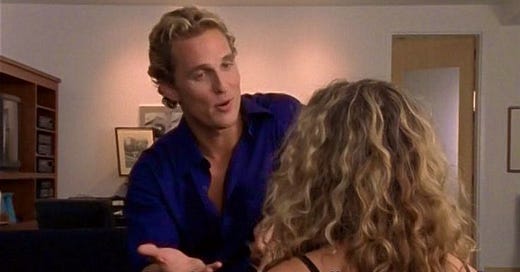The first time I watched Sex and the City was in 2020, right in the thick of my situationship with my own personal Mr. Big. I was convinced we’d end up together. The push and pull, the uncertainty, the emotional whiplash—I told myself it was all part of our great love story. If Carrie and Big could go through years of chaos and still end up together, then maybe we would too.
At the time, watching SATC felt like comfort and reassurance. Here was this smart, (sort of) stylish woman who literally wrote about love for a living and even she didn’t have it figured out. She made the same mistakes I did—chased the wrong men, ignored red flags, and romanticized inconsistency. But the problem was that Carrie’s story had a fairytale ending. She did end up with Big, even after he left her at the altar in what should’ve been a point-of-no-return moment. And that, my friends, is what I like to call bullshit.
No woman should ever go back to a man who left her on the most important day of her life. No one should accept that kind of humiliation and heartbreak, tie it up with a bow, and call it romance. Women dream of their wedding day. They fantasize about the dress, the venue, and the moment they say "I do" to the person who loves them more than anything. Yet, there Carrie was—getting out of a limo in her designer wedding gown, mascara running, crying in the middle of the street because Big changed his mind. Only to have him turn the car around and act like he could just erase it all with an apology.
The worst part? She took him back.
Carrie deserved better than that. I deserved better than that. But back then, I didn’t see it that way. I saw her as proof that dysfunctional love stories still had a shot at a happy ending. That as long as there was history, passion, and some half-assed apology, it was okay to stay. It took me years to see the truth: Carrie Bradshaw wasn’t a relationship expert—she was a cautionary tale.
For someone who built a career writing a sex and relationships column, she surely didn’t take her own advice. She wrote about what not to do and then did it anyway! She self-sabotaged, romanticized suffering, and strung along a perfectly good man (Aidan!) while she pined over the one who treated her like an option. She was selfish. She was delusional. And at one point, I wanted to be just like her.
When I finally walked away from my own Mr. Big, I saw SATC through a new lens. I stopped seeing Carrie as someone to idolize and started seeing her for who she really was—flawed, messy, and ultimately, a woman who settled. A man like Big might come back, but he will always leave again. That’s not love, it’s a slow-burning heartbreak that you let drag on for years because you don’t know anything different.
Carrie Bradshaw may have been entertaining, but she wasn’t aspirational. And if I’ve learned anything, it’s that love shouldn’t look like uncertainty. It shouldn’t feel like waiting. It shouldn’t require chasing.
So if you’re in your Big era right now—if you’re waiting for someone to change, waiting for them to wake up and love you the way you deserve—let me save you some time. Close the book on that chapter before it writes you into the same unfortunate ending. Because if Carrie taught us anything, it’s that sometimes even the women we look up to don’t have it figured out. And maybe, just maybe, we can do better than the love stories we grew up idolizing.
PS: My debut novel, Call It What You Want, is available to order here. I appreciate your time and support more than you know! ILYSM <3





